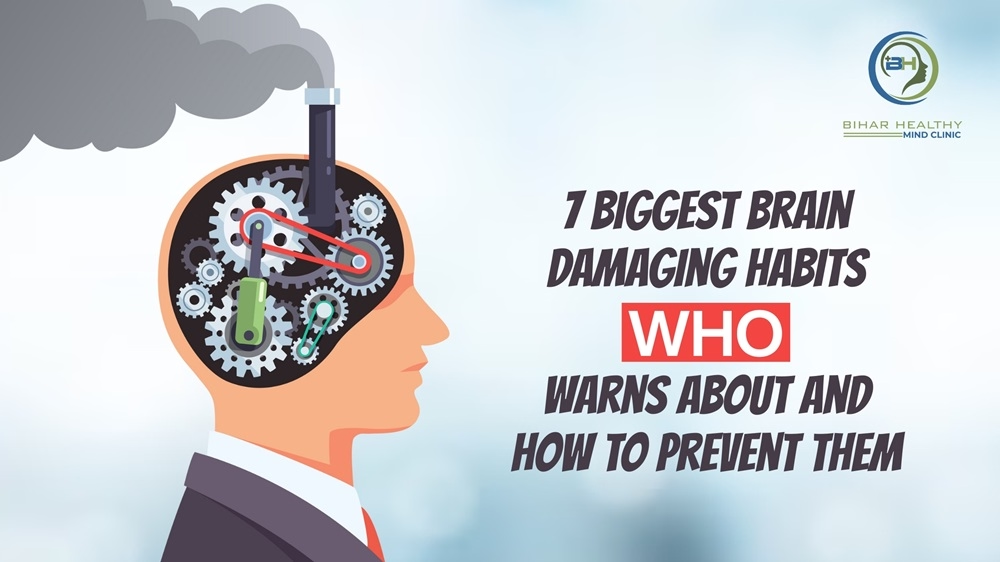
The World Health Organization (WHO) has repeatedly emphasized the importance of lifestyle choices for protecting brain health. The brain is central to every function controlling thought, memory, emotions, and decision-making, yet small daily habits can slowly cause long-term harm. In fact, experts point to the 7 biggest brain damaging habits WHO highlights as significant global health concerns.
At Patna Psychiatry, under the guidance of Dr. Saurabh Kumar, MD (Psychiatry), widely regarded as the best psychiatrist in Patna, patients receive holistic care and treatment plans to address these risks. This blog explores these damaging habits, their effects, and practical ways to prevent them.
7 Biggest Brain-Damaging Habits
The World Health Organization highlights several everyday habits that silently harm brain health. Here’s the list you need to be aware of:
1. Inadequate Sleep
WHO reports show that chronic sleep deprivation reduces brain performance and raises risks of mental illness. Sleep allows the brain to detoxify, repair, and consolidate memory. Without it, concentration, mood stability, and immunity suffer.
-
Prevention Tips:
- Aim for 7-9 hours of quality sleep.
- Reduce late-night screen exposure.
- Develop a calming bedtime routine.
2. Chronic Stress
Among the 7 biggest brain damaging habits WHO identifies, unmanaged stress is a major factor. Excess stress releases cortisol, damaging memory-processing areas of the brain and increasing risks of anxiety and depression.
-
Prevention Tips:
- Try relaxation practices like yoga or meditation.
- Stay physically active to reduce cortisol naturally.
- Seek professional therapy if stress persists.
3. Poor Diet and Malnutrition
Unhealthy diets lacking in essential nutrients impair neurotransmitter function. WHO links malnutrition and excessive sugar intake to impaired cognitive development and poor emotional regulation.
-
Prevention Tips:
- Incorporate fresh fruits, vegetables, and omega-3s.
- Limit processed food and excess sugar.
- Stay hydrated throughout the day.
4. Sedentary Lifestyle
A lack of movement decreases oxygen and nutrient supply to the brain. WHO notes that inactivity contributes to dementia risk and poor emotional resilience.
-
Prevention Tips:
- Include at least 30 minutes of activity daily.
- Choose active breaks over prolonged sitting.
- Consider outdoor exercise for additional mental benefits.
5. Substance Abuse
Alcohol, nicotine, and recreational drugs are recognized by WHO as critical threats to brain health. These substances alter brain chemistry, shrink gray matter, and may lead to permanent psychiatric conditions.
-
Prevention Tips:
- Avoid or strictly limit harmful substances.
- Replace harmful coping mechanisms with healthier activities.
- Consult a psychiatrist for de-addiction support if needed.
6. Social Isolation
WHO has highlighted social health as key to brain well-being. Isolation increases risks of depression, cognitive decline, and even Alzheimer’s disease. Active social interaction stimulates the brain, keeping it sharp.
-
Prevention Tips:
- Engage in conversations with family and friends.
- Join clubs, classes, or community groups.
- Seek therapy if isolation feels overwhelming.
7. Ignoring Mental Health
One of the 7 biggest brain damaging habits WHO consistently warns against is the neglect of mental health conditions. Delaying treatment for issues like depression, anxiety, or obsessive behaviors can worsen outcomes and damage brain function.
-
Prevention Tips:
- Pay attention to early warning signs.
- Consult a psychiatrist early for evaluation.
- Follow treatment plans with consistency.
Why It Matters
The WHO stresses that addressing these habits reduces the global burden of mental illness and neurodegenerative conditions. Prevention not only enhances brain health but also improves quality of life and productivity.
Psychiatric Care in Preventing Brain Damage
At Patna Psychiatry, patients receive tailored treatment that aligns with WHO guidelines. With the expertise of Dr. Saurabh Kumar, the best psychiatrist in Patna, care includes:
- Counseling and psychotherapy
- Stress and lifestyle management
- Nutritional and behavioral guidance
- De-addiction programs and support
This holistic approach helps individuals replace harmful habits with sustainable, healthier choices.
Conclusion
The 7 biggest brain damaging habits WHO identifies including poor sleep, stress, inactivity, and neglecting mental health are everyday risks with lifelong consequences. Prevention, timely intervention, and professional support can protect the brain and ensure mental resilience.
For anyone struggling with these issues, reaching out to a psychiatrist can be life-changing. At Patna Psychiatry, Dr. Saurabh Kumar provides expert, compassionate, and personalized care, helping individuals safeguard their brain health and live fuller lives.
Visitors: 132





No comments yet.